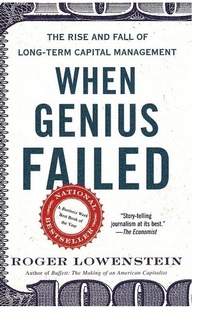

Purchase
The Rise and Fall of Long-Term Capital Management
Random House Trade Paperbacks
October 2001
On Sale: October 9, 2001
288 pages
ISBN: 0375758259
EAN: 9780375758256
Trade Size
Add to Wish List
Non-Fiction
John Meriwether, a famously successful Wall Street trader,
spent the 1980s as a partner at Salomon Brothers,
establishing the best--and the brainiest--bond arbitrage
group in the world. A mysterious and shy midwesterner, he
knitted together a group of Ph.D.-certified arbitrageurs who
rewarded him with filial devotion and fabulous profits.
Then, in 1991, in the wake of a scandal involving one of his
traders, Meriwether abruptly resigned. For two years, his
fiercely loyal team--convinced that the chief had been
unfairly victimized--plotted their boss's return. Then, in
1993, Meriwether made a historic offer. He gathered together
his former disciples and a handful of supereconomists from
academia and proposed that they become partners in a new
hedge fund different from any Wall Street had ever seen. And
so Long-Term Capital Management was born. In a decade that had seen the longest and most rewarding
bull market in history, hedge funds were the ne plus ultra
of investments: discreet, private clubs limited to those
rich enough to pony up millions. They promised that the
investors' money would be placed in a variety of trades
simultaneously--a "hedging" strategy designed to minimize
the possibility of loss. At Long-Term, Meriwether & Co.
truly believed that their finely tuned computer models had
tamed the genie of risk, and would allow them to bet on the
future with near mathematical certainty. And thanks to their
cast--which included a pair of future Nobel Prize
winners--investors believed them.
From the moment Long-Term opened their offices in posh
Greenwich, Connecticut, miles from the pandemonium of Wall
Street, it was clear that this would be a hedge fund apart
from all others. Though they viewed the big Wall Street
investment banks with disdain, so great was Long-Term's aura
that these very banks lined up to provide the firm with
financing, and on the very sweetest of terms. So
self-certain were Long-Term's traders that they borrowed
with little concern about the leverage. At first,
Long-Term's models stayed on script, and this new gold
standard in hedge funds boasted such incredible returns that
private investors and even central banks clamored to invest
more money. It seemed the geniuses in Greenwich couldn't lose. Four years later, when a default in Russia set off a global
storm that Long-Term's models hadn't anticipated, its
supposedly safe portfolios imploded. In five weeks, the
professors went from mega-rich geniuses to discredited
failures. With the firm about to go under, its staggering
$100 billion balance sheet threatened to drag down markets
around the world. At the eleventh hour, fearing that the
financial system of the world was in peril, the Federal
Reserve Bank hastily summoned Wall Street's leading banks to
underwrite a bailout. Roger Lowenstein, the bestselling author of Buffett,
captures Long-Term's roller-coaster ride in gripping detail.
Drawing on confidential internal memos and interviews with
dozens of key players, Lowenstein crafts a story that reads
like a first-rate thriller from beginning to end. He
explains not just how the fund made and lost its money, but
what it was about the personalities of Long-Term's partners,
the arrogance of their mathematical certainties, and the
late-nineties culture of Wall Street that made it all possible. When Genius Failed is the cautionary financial tale of our
time, the gripping saga of what happened when an elite group
of investors believed they could actually deconstruct risk
and use virtually limitless leverage to create limitless
wealth. In Roger Lowenstein's hands, it is a brilliant tale
peppered with fast money, vivid characters, and high drama.
Comments
No comments posted.
Registered users may leave comments.
Log in or register now!
| 


 © 2003-2025 off-the-edge.net
all rights reserved Privacy Policy
© 2003-2025 off-the-edge.net
all rights reserved Privacy Policy